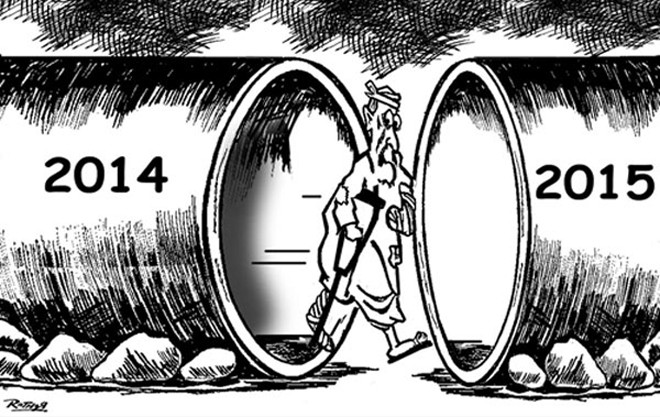
What may make 2015 a year different for Pakistan?

An upset set is a new set. When we knowingly contribute to the upset-ness of the set, it is a project, a movement or a bold public policy initiative. When the set gets upset without our anticipation, without our intention but with our (however inadvertent!) participation, and we feel surprised or express shock, we are either children at play, or fools who were looking elsewhere when the upset-ness was brewing.
It seems, in 2014, Pakistan’s civil and military leadership were playing fools -- as the set got too upset. If they had their eyes on the right spots, and thinking minds behind those eyes, we would not have seen several crises and certain tragedies.
Like, the evaporation of the political legitimacy of the prime minister due to prolonged dharna of the PTI may have been averted. The hammering-an-ant reaction of the Punjab chief minister in Model Town that turned Qadri’s storm in a tea cup to flash flood on the streets could have been avoided. We may not have seen the PTI’s long and impressive protest literally gone to waste had Imran Khan shown better cricketing sense of timely declaring the test-inning when the government had agreed to five of his six points.
We may have perhaps evaded Peshawar carnage too if the PTI government were more focused on KP, and less on the D-Chowk, and had a functional safety plan to tackle the anticipated spill-over of the Zarb-e-azb operation. And, if Geo had acted professionally in the wake of attack on Hamid Mir, the electronic media may not have seen the internecine war of attrition that ensued and is not over yet.
The PM did not take Imran’s legitimate demand for enquiry into suspect electoral results, and allowed the set of his political legitimacy get upset. His belated acquiescence to set up the judicial commission betrayed lack of foresight, political acumen, and timidity.
As I write these lines on the last day of 2014, politically speaking, Imran is concluding the year as a badly shaken person. The popular following he enjoyed a year ago was hinged on great expectations. Today, the nominal support he has from peers and people is part sympathy and part charity.
Similarly, had Shahbaz Sharif relied more on politics to negotiate with Qadri, and less on brutal force, the latter may have enjoyed his summer in Canada and not spoiled ours either.
Away from the political tamasha of August, if the so-called deep state, which in 2014 only revealed its unfortunate shallowness to the core, had directly asked the prime minister the concessions they needed regarding General Musharraf, India, Afghanistan and the US, they could have had a far better deal at far less costs of money, time, energy and reputation.
The only ‘wrong things’ that made economic sense were media’s anti-Geo frenzy and mullah’s rabidity (its lowest point, ironically on Geo was when they pointed fingers at Ahmadis as the real perpetrators of the Peshawar carnage). Media’s madness helped it mint money, and religious rabidity kept mullah’s business afloat.
Now the key question: How can 2015 be better for Pakistan, if at all, than 2014?
In all likelihood, 2015 may be worse than the last year if there is a sequel to the PTI-PAT political tamasha, and even worse, if the same script-writer lurks behind the wings, which though is less likely. Or if the PM does not surf the high-waves of political consensus and falls back on his typical lackadaisical posturing, and instead of taking the bull of religious militancy by the horns, tries to hide behind the Constitution.
The society, polity and security in Pakistan have rotted slowly and gradually over the years. There is no quick fix. We must allow at least six years to undo the rot of 60 years. The military courts, however, constitutionally well-covered, will not dispense justice or dent the religious militancy. Hot-cakes of hate speech need firm clamping and broadcast from mosques need to be regulated and enforced just like radio or TV broadcast -- licensed and censored.
The omnipresence of small weapons needs political handling. The artificially projected omnipotence of Army needs to be rethought, as we are here because of continuous over-reliance on the guns and boots. We have painfully seen in the last six decades that strategising from military lens have obvious limitations: devoid of big-picture comprehension, deep analysis and shorn of negotiation space or skills. The counter-terrorism needs to rely more on foresight, anticipation and preemption and the least on use of force, farce trials, or stone-age reaction of hammering an ant.
So, if the civil-military leadership wants 2015 to be better than 2014, they must design the upset-ness of the rotting set by devising a long-term plan that ensures deepening of democracy through effective local governments (and on that the choice is between LG elections or mid-term polls); curbing the spread of hatred through media or the mosque; ending the private exercise of violence by mobs; resorting to the Army sparingly and prudently; and focussing more on internal economic transformation than building a false international image. If Malala’s Nobel feat did not help us with a better image, nothing will.
Personally, I wish Pakistan wins the Cricket World Cup in 2015. That will heal and help in many ways!